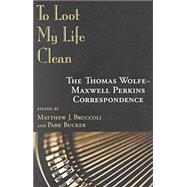Celebrated for his close literary relationships with F. Scott Fitzgerald, Ernest Hemingway, and other literary giants of the early twentieth century, Maxwell Perkins was both mentor and father figure to Thomas Wolfe. According to the introduction, "The letters published here document Wolfe's artistic and professional problems, and demonstrate how Perkins, serving as both editor and friend, aided Wolfe in solving them. Only by considering all of the author/editor/publisher correspondence can Wo








